Final report for SKY16-001
Project Information
The UK team of Dr. Paul Vincelli and Brett Wolff is integrating SARE objectives and activities in a wide variety of programs and initiatives. Dr. Vincelli brings not only his expertise in integrated disease management, but also interest and experience in dealing with key sustainability issues including climate change, cover crops, and genetically engineered crops, including CRISPR genome editing. Brett’s training in the social sciences, along with his recent experience in specialty crop production research at UK, gives him a grounded, valuable perspective on sustainability issues. The Model State Program at the University of Kentucky plans to include trainings for agricultural professionals, supported with its $10,000 SARE Budget through several primary activities:
- Food Safety Trainings covering FSMA and GAP
- Cover Crops and Soil Health
- Ecological Livestock Production
- Sustainability Considerations for GMO/GE Crops
- Low-Input Spray Guides for Various Fruit Crops
In 2016-17, communicated with our Advisory Committee via email, particularly actively during the development of our work plan. One point of emphasis this year will be evaluating our Advisory Committee and encouraging some new membership according to our previously stated goal of three- year term rotations.
Kentucky’s SARE PDP program objective is to build a broad base of interest and skills in agricultural sustainability among extension agents and other professionals in the state, equip them with the needed skills to assist farmers, marketers, and community leaders, and to facilitate a diverse range of collaborative projects. Building effective partnerships with NRCS, FSA, and the Kentucky Department of Agriculture is an additional objective.
Advisors
- (Educator and Researcher)
- (Educator)
- (Educator)
- (Educator)
- (Educator)
- (Educator and Researcher)
- (Educator and Researcher)
- (Educator)
- (Educator)
- (Educator)
- (Educator and Researcher)
- (Educator)
- (Educator)
Education
Our approach with our MSP has been to provide support for existing initiatives or to convene groups of people with common interests in the hopes of spurring action. The educational approaches of the programs we support are quite diverse, but we are guided by the principle of focusing on trainees who can then go forth to impact additional members of the community. Though not always a strict "Train-the-Trainer" we do advocate for introducing or expanding on sustainability topics for a wide range of agricultural professionals in this state.
Education & Outreach Initiatives
To help refugee farmers from Burundi or the Democratic Republic of the Congo or The Congo to learn English farming terminology and farming techniques for temperate climates.
KYSARE funds were used to support the Jefferson County Cooperative Extension New American Farmer Training Program, a winter farming workshop for refugees living in Louisville. Support went toward visual teaching aids and take-home information for thirty gardeners who wanted to practice their English and learn about growing crops in temperate climates. 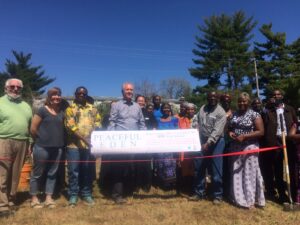
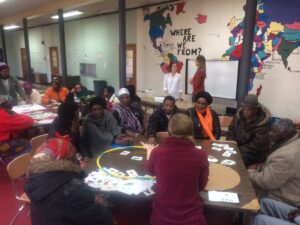 The majority of the thirty gardeners’ country of origin was either Burundi or the Democratic Republic of the Congo or The Congo. The course took place weekly for ten weeks in January, February and March. Community partners in this program were Americana World Community Center; Louisville Grows; Common Earth Gardens of Catholic Charities; and Gates of Hope (community center for Burundians in Louisville).
The majority of the thirty gardeners’ country of origin was either Burundi or the Democratic Republic of the Congo or The Congo. The course took place weekly for ten weeks in January, February and March. Community partners in this program were Americana World Community Center; Louisville Grows; Common Earth Gardens of Catholic Charities; and Gates of Hope (community center for Burundians in Louisville).
KYSARE provided partial funding support, but the program outcomes include:
- Collaboration between multiple organizations
- helped confirm the need for an incubator space in Louisville for Refugee growers
- facilitated stronger relationships among all the partner organizations
- identified some of the cultural groups to target when recruiting for an incubator farm program.
Convene some of the largest grain farmers in the state to discuss cover cropping benefits, challenges, and tecniques.
AGENDA
Kentucky No-Till and Cover Crop
Soil Health Forum
March 23rd
UK Research and Education Center in Princeton
Moderator: Steve Blanford
8:30 – 9:00 Registration
9:00 – 9:15 Welcome and introductions
9:15 – 9:30 Soil Health Demos – Dr. Dennis Chessman
9:30 – 9:45 Farmer - Jerry Peery
9:45 – 10:00 Farmer - Micah Lester
10:00 – 10:15 Realistic Organic Matter – Dr. John Grove
10:15 – 10:30 BREAK
10:30 – 10:45 Potential Nitrogen benefits from cover crops – Dr. Mark Coyne
10:45 – 11:00 Farmer - Roger Boyd
11:00 – 11:15 Farmer - Barry Alexander
11:15 – 12:00 Farmer Panel
12:00 – 12:30 WORKING LUNCH
12:30 – 3:00 Farm Visits:
Farmer – Jon Beavers
Farmer - Jake Jones
County Conservation Districts: Caldwell, Calloway, Christian, Crittenden, Hickman, Hopkins, Livingston, Lyon, Marshall, Todd, and Trigg
- Discussion of the various benefits for Cover Crops
- Blended Farmer and Research/Extension experiences
- 60 Farmer Participants
- Participation from 11 conservation districts
From the organizers: The Soil Health and Cover Crop meeting held in Princeton last week was a big success, and we appreciate SARE’s willingness to help fund the meeting. Several conversations discussing the value of soil health management systems were able continue throughout the day. Without SARE’s assistance, those valuable conversations would not have occurred. I have attached an Agenda for the meeting and a list of those in attendance
To provide supplementary materials that extension agents and farmers requested to support cover cropping education.
One interesting realization coming out of the 2016 Southern Cover Crops Conference in Goldsboro was that cover crop needs are fairly diverse across the SSARE states. In the case of Kentucky, the Western part of the state (which is home to our largest acreage grain and livestock operations) actually has more in common with the Midwest than the Southeast. As such, our KY Cover Crop Extension Team (Dr. Erin Haramoto, Plant and Soil Sciences; Dr. Jordan Shockley, Agriculture Economics; Dr. Edwin Ritchie, Plant and Soil Science--Princeton, KY; and Steve Blanford, USDA-NRCS) decided that it would be judicious to provide copies of the Midwest Cover Crops Field Guide, Second Edition as a supplement to Managing Cover Crops Profitably.
375 Copies of this book have been made available to extension agents, growers, and various other ag outreach professionals.
We had a producer who is a leader in urban agriculture approach us for funding to SSAWG after the SSARE travel scholarship deadline had passed. We wanted to support his travel.
What impressed me most about the gathering was the wide variety of farmers and agricultural specialists, representing an array of methods, backgrounds, and settings of operation--rural, urban, academic, and extension agents. I tried to weave my way into this unique opportunity to become acquaintance with so many, especially those with a different perspective than my own.
For instance, I was especially impressed to see so many farmers of color and specifically black farmers--I've never seen so many in one place; and I attended the session led by the keynote speaker from the conference dinner, Rashid Nuri of TLWUrbanAG, to learn about how their NGO is operating in the urban center of Atlanta. The New Roots and Fresh Stop organizations in Lexington and Louisville are also doing excellent work in food justice, providing fresh food in non-privileged urban communities, and so I attended their session to learn more about that and how it might relate to similar areas in Bowling Green and surrounding counties. I also sought out discussions with those from Kentucky State University, and made acquaintance with Andre Barbour and Tehran Jewel, who led a discussion on pastured poultry. I have since followed up with them to communicate possibilities for collaboration on a project just now beginning here in Warren County at a 40 acre field owned by the Bowling Green Housing Authority, which was recently registered as a farm. Warren County Soil and Water Conservation District has asked me to draw up designs for a demonstration garden that conserves water, builds soil, and plants polyculture; the designs that I'm drawing up include possibilities for pastured poultry, and I'm hoping to connect again with Andre and TJ in the near future to see if they may assist us at the Housing Authority as we progress, although we are just now breaking ground. We also may be collaborating this fall to assist the Bowling Green International Center in developing and expanding their refugee community garden; so far we've had one meeting about that and the next one is coming up. I don't own any land, but I have collaborated with several organized efforts to create urban and rural gardens in under-served neighborhoods and communities. I sought out relevant presentations and sessions.
KSU experts on pawpaw growing, propagation, and production were also present, and since over the last two years I have planted over 300 asimina triloba, the native pawpaw, I sought their advice and experience on growing habits, and finding other cultivars. Angela Whitehouse was particularly helpful; she connected me with Cliff England of England's Orchard Nursery, from whom I have since purchased several varieties of pawpaws and other fruit and nut shrubs and trees. I'm hoping to visit his farm this fall. I would like to visit KSU too.
In a similar vein, I attended discussion sessions and sat at dinner tables with extension agents and academic researchers to hear what sorts of innovations, challenges, and analysis of agricultural landscapes and operations they presented. When the discussion turned toward large-scale monoculture rotations, something I find deeply unsustainable, when it came my turn to speak, I briefly presented 100 acre plus perennial agricultural systems, silvo-pasture and agro-forestry systems from around the nation, and particularly relevant to the oak savannah biome that characterizes Western Kentucky, where I live, where most of Kentucky's scaled agriculture happens. I asked if they knew of any silvo-pasture research or programs; some suggested a couple sources in Missouri, but I couldn't find a lot of information. When I returned home I approached our Warren County USDA-NRCS to see if they knew of any research or funding opportunities for silvo-pasture on small, mid, or largescale acreage. Seeing as they couldn't provide me with much information, I followed up by assembling pictures, videos, and descriptions from farmers operating scaled silvo-pasture and agro-forestry systems appropriate to an oak savannah biome and presented them to Warren County agricultural and land use authorities in meetings that we have since had regarding county-sponsored agricultural initiatives. Timothy Bartee, Supervisory Natural Resource Manager with USDA-NRCS took particular interest in learning more of these systems. I am scheduled to meet with him in his offices to discuss further. I will be presenting him with this book and this video tutorial of how and why to set up such systems:
I also attended workshops and sessions geared more toward what I am already doing, such as the 2 day workshop on Permaculture led by the farmers from Radical Roots Farm in the Shenandoah Valley, VA. Over a 2 day course they over-viewed and we discussed permaculture ethics, principles, and practice. Although their farm is mostly a certified organic vegetable operation, they did an excellent job of leading the workshop in such a way as to aid farmers in designing their variety of farms using the permaculture approach. We each were to bring a satellite image of our landscape of operation; then to work alone outside the class and in small groups during the class to draw up and envision permaculture-inspired designs for the landscape and farm operation. Since this is what I do for a living for small farms and urban properties throughout the Barren River Counties, I very much enjoyed these interactive design discussions among the working groups. After the 2 day class ended, I deepened the connection by going out to dinner with the owners of Radical Roots Farm, and together with a young farming couple from just outside Louisville, who had recently purchased a 10 acre farm, we drew up possible designs for their new farm.
The session on agricultural cooperatives, "Fair Prices for Farmers and Good Food for All," greatly influenced my thinking. At that session we mostly discussed cooperatives of produce sales aggregated by regional growers, similar to the model of the Burley Tobacco Growers Cooperative Association, or the Organic Valley Cooperative. It made me consider other possible forms of aggregating cooperatives. Since then I have thought a lot about organizing an agricultural and natural building cooperative, which would aggregate the skill sets of worker-owner-designers in biodiverse agricultural systems and vernacular building, an aggregation of worker-designers that would be hired to author and help implement such design systems on landscapes of various sizes and settings--it's what I already do as an individual consultant. Instead of aggregating the cooperative around the sale of produce, this cooperative would be aggregated around the design and implementation of agricultural and natural building systems. I have secured affirmation from a lawyer in Louisville who would help those interested go through the legal processes of creating by-laws and legitimizing the cooperative under commonwealth statutes. Just last week in Berea I met with and worked as a volunteer on a project with some friends who are skilled natural builders, and we discussed this idea at forming a cooperative; I have also had some preliminary meetings with gardeners and builders in the Barren River counties. I am very interested to know what sorts of assistance UK SARE or any agricultural institution may offer in that regard, advice/assistance on forming cooperatives.
Thank you again for the opportunity. I hope these paragraphs relate some of how I tried to make the best of it.
Timothy Kercheville
PS
Here's a picture of me from one of the projects I lead, this picture from last week at our main crop harvest at the William Natcher Elementary School student garden, a 1/2 acre student garden of swales on contour terracing the slope above the stormwater drain. We started the project the day before spring break, beginning with a compact clay lawn. Students of the school did everything together from start to finish, learning to map contour, dig swales, plant native and food-bearing trees and shrubs, native wildflowers in a pollinator garden, and a polyculture of mixed vegetables and herbs. This was from the sweet potato harvest last week.
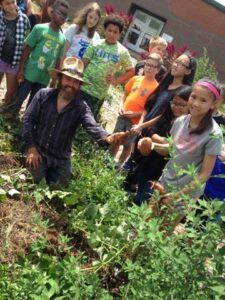
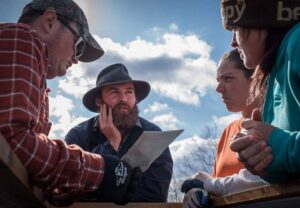
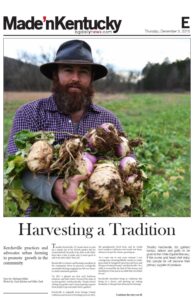
See above.
To explore the potential contributions of Genetic Engineering to the field of sustainability.
Genetically engineered crops (GE crops, also often called “GMOs”) generate substantial interest and controversy. SARE presentations on this topic are based strictly on scientifically credible evaluations of a wide range of sustainability issues. On the “plus” side, the public is commonly very interested to hear of the well-documented benefits of certain GE crops. For example, substantial reductions in insecticide use have occurred as a result of Bt traits in several crops throughout the world. Another example: GE papaya has literally saved the papaya industry in Hawaii. However, the public is equally interested in learning about the “minus” side: the legitimate concerns that scientists have documented with respect to certain GE traits. An excellent example of this is presented by herbicide-tolerant crops. Roundup-Ready crops (engineered to be tolerant of glyphosate weedkiller, sold as Roundup™ herbicide) have significant, well-documented benefits for the farmer and for the environment. However, in a nutshell, they do not represent a sustainable, long-term approach to weed control.
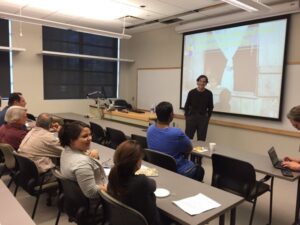
Because our SARE programs on GE crops are so well-grounded in objective and science-based analysis, the public seems to be consistently very appreciative of them (which has been documented quantitatively in post-program surveys).
Programs partially funded through SARE funds
Parenthetic number indicates estimated number of participants
Commonly 35-65% female attendees
- Food Myths and Misconceptions – Genetic Engineering, offered by the joint Owensboro Extension programs on the campus of Owensboro Community College, 24 Apr and 25 Apr 2017 (30)
- Biotech (GMO) Crops: Scourge or Salvation, Boone County Extension Office, 18 Apr 2017 (45)
- GE Crops and the Environment, Sierra Club Bluegrass Chapter, Lexington, 20 Mar 2017 (25)
- GE Crops and the Environment, Shelby County Extension Office, 16 Mar 2017 (20)
- GMO Crops: Scourge or Salvation? Boyd County, 24 Feb 2017 (20)
- GMO Crops: Scourge or Salvation? Franklin County Extension Office, 9 Feb 2017 (10)
- GMO Crops: Scourge or Salvation? Mason County Extension Office, 6 Feb 2017 (10)
- Understanding GMOs, Bowling Green, 10 Jan 2017 (8)
- Understanding GMOs, Farmers Market members, Central City KY, 9 Jan 2017 (12)
- Understanding GMOs, Warren County farmers meeting, Bowling Green, 9 Jan 2017 (8)
- GMO Crops: Scourge or Salvation? Kentuckiana Crops Meeting, French Lick, IN, 29 Nov 2016 (120)
- GMO Crops, Scott County Farm City Committee, 22 Nov 2016 (120)
- Understanding GMO’s (Genetically Modified Organisms), Oldham County, 5 Nov 2016 (25)
- GMO Crops, Fayette County Farm Bureau, 20 Oct 2016 (35)
- GE crops, Marshall County Master Gardeners, 25 Aug 2016, via online delivery (20)
We supported this programming in 2 ways: we provided partial funding for the 2016 KY Grazing Conference (details below). We also provided funding to print the extension publication: ID-224: Producer's Guide to Pasture-Based Beef Finishing
16th Kentucky
Grazing Conference
October 19, 2016
8:00 am – 3:30 pm EDT
The Center for Rural Development
Somerset, KY
Sponsored by:
Kentucky Forage & Grassland Council & University of Kentucky College of Agriculture, Food & Environment
16th Kentucky Grazing Conference
8:00 EDT Registration, Visit Exhibits, Silent Auction
8:45 Welcome
9:00 Producer’s Guide to Pasture-Based Beef Finishing (Dr. Greg Halich)
9:20 Marketing Grassfed Beef 101(Anne Bays)
9.40 Cutting Edge Grazing Research (Dr. Glen Aiken)
10:00 Break
10:30 Farmer Success with NRCS Cost Share (Adam Jones)
10:45 Adaptive Grazing for Healthy Soil (Dr. Greg Brann)
11:15 Soil Health = Farmer Wealth (Dr. Peter Byck)
12:00 Discussion
12:15 Lunch and Awards
1:15 Silent Auction Results
1:30 Maximizing Sugar Concentration in Cool Season Grasses (Kelly Prince)
1:50 Forage Spokesman Contest
3:30 Adjourn
Program Participants
Dr. Glen Aiken, Director, USDA/ARS Forage-Animal Production Research Unit
Dr. Greg Brann, TN Grazing Lands Specialist, Natural Resources Conservation Service
Dr. Peter Byck, Professor, Producer and Director; School of Sustainability & Cronkite School of Journalism, Arizona State University
Dr. Greg Halich, Associate Professor, Extension Agricultural Economist, University of Kentucky
Mr. Adam Jones, KY State Grazing Specialist, Natural Resources Conservation Service
Ms. Anne Bays, USDA Certified Grassfed Beef, Moonlight Farm LLC
Ms. Kelly Prince, Masters Candidate, University of Kentucky
~100 attendees at the Grazing Conference
750 copies of ID-224 made available to agents, producers, and other ag outreach professionals.
I'll note that one of the coordinators of this event has successfully purused a regional SSARE PDP grant for “Pasture-Based Beef Finishing in the Upper South – Practical Systems that Work”
To support Extension Specialists and Associates in attending professional development engagements that align with SSARE's vision of sustainability. These two groups, surprisingly, suffer from a shortage of funds for this kind of travel.
We supported a number of professionals to attend different events across the region. Extension networks around the region are dwindling and working together and travelling across state lines will continue to be an important feature of effective sustainability outreach.
Extension Associate attended a day-long workshop and site visit to see how Green Edge Gardens grows produce for market year-round. They also toured ACEnet’s Food Ventures Center incubator kitchen and hear the role of this kitchen and their organization in creating a sustainable regional economy in Appalachian Ohio.
Extension Associate Attended the 2017 Ohio Ecological Food and Farming Association annual conference. Topics included organic and small-scale production, local food system development, marketing for small growers, cost-accounting, and various others.
Extension Specialist attended the West Virginia Small Farms and Indiana Small Farms Conferences. As their names imply, both conferences focus on the needs of small farms and parallel nicely with the KSU small farm conference held each year in November. That Specialist strengthened her network to allow for greater collaboration in creating a regional team to develop resources used by small farmers.
Extension Professor and Specialist attended the Southern Extension and Research Activity 45 focused on specialty crop production and regional resources. This ongoing activity stands to be the organizing body for better regional collaboration in developing production and marketing resources that would benefit specialty crop growers. Specialty crop growers in this region tend to be smaller and have very particular needs that can be challenging to address.
Extension Professor and Associate attended Organic Association of Kentucky annual conference. This conference covers organic farming practices, marketing of organic produce, and a discussion of the future role of organic farming in Kentucky's agricultural economy and cultural life.
To demonstrate alternative pest management strategies
This was minor support for materials to demonstrate small-scale fruit pest and disease managment including scouting, spraying, and bagging fruit.
Educational & Outreach Activities
Participation summary:
Learning Outcomes
Project Outcomes
Face of SARE
Kentucky’s SARE PDP program objective is to build a broad base of interest and skills in agricultural sustainability among extension agents and other professionals in the state, equip them with the needed skills to assist farmers, marketers, and community leaders, and to facilitate a diverse range of collaborative projects. The way that we manage our programs has led to strong partnerships with the Kentucky Department of Agriculture, NRCS, FSA, Community Farm Alliance, Kentucky Center for Agricultural and Rural Development, the Cooperative Extension Service, Grow Appalachia, as well as grower groups across the state.
The program assistant is often the face of the KYSARE program, since half of his job is to support and implement the Model State Plan. He is actively involved in Kentucky State University’s “Third Thursday Thing” monthly sustainable ag field days and in the wide range of program activities.The core job of KY SARE’s Program Assistant is coordinating all of the SARE-promoted trainings.
Because sustainable agriculture programs in Kentucky extend much beyond the SARE-supported programs, the program assistant actively participates in other activities. This includes attending extension and grower events where he simultaneously represents KYSAREHis engagement with these programs assists in expanding the visibility of the SARE Program. The current Program Assistant has strong networking and leadership skills that help us build productive partnerships with FSA, KDA, and NRC